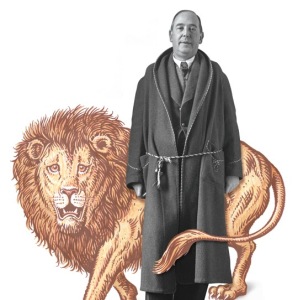What has impressed me tremendously as I read through the letters of C. S. Lewis to Americans is his genuineness. He takes time to respond even to those most of us would consider a bother. I’m now into 1955 in these letters, and at this point Lewis is getting a steady stream of them from children who are reading his Narnia books.
 One letter stands out. It’s actually written to the boy’s mother, who has informed Lewis that her son is worried because he thinks he loves Aslan more than Jesus. Lewis wrote back to the mother what she should say to her son, Laurence. I find this letter fascinating. Lewis begins this way:
One letter stands out. It’s actually written to the boy’s mother, who has informed Lewis that her son is worried because he thinks he loves Aslan more than Jesus. Lewis wrote back to the mother what she should say to her son, Laurence. I find this letter fascinating. Lewis begins this way:
Even if he was loving Aslan more than Jesus (I’ll explain in a moment why he can’t really be doing this) he would not be an idol-worshipper. If he was an idol-worshipper he’d be doing it on purpose, whereas he’s now doing it because he can’t help doing it, and trying hard not to do it.
Lewis then gets tot he crux of the matter and explains why Laurence needn’t worry at all:
But Laurence can’t really love Aslan more than Jesus, even if he feel that’s what he is doing. For the things he loves Aslan for doing or saying are simply the things Jesus really did and said. So that when Laurence thinks he is loving Aslan, he is really loving Jesus: and perhaps loving Him more than he ever did before.
 Even though Lewis was still a bachelor at this time, and he never had any children of his own, he remembered his childhood and how a child thinks. How else to account for the astounding success of the Narnia books? He realizes that Laurence, as a small boy, is naturally attracted to certain things, and he helps ease both the mother’s and the boy’s concerns when he delves even further into the matter:
Even though Lewis was still a bachelor at this time, and he never had any children of his own, he remembered his childhood and how a child thinks. How else to account for the astounding success of the Narnia books? He realizes that Laurence, as a small boy, is naturally attracted to certain things, and he helps ease both the mother’s and the boy’s concerns when he delves even further into the matter:
Now if Laurence is bothered because he finds the lion-body seems nicer to him than the man-body, I don’t think he need be bothered at all. God knows all about the way a little boy’s imagination works (He made it, after all) and knows that at a certain age the idea of talking and friendly animals is very attractive. So I don’t think He minds if Laurence likes the Lion-body. And anyway, Laurence will find as he grows older, that feeling (liking the lion-body better) will die away of itself, without his taking any trouble about it. So he needn’t bother.
He then suggests a prayer that Laurence can offer to God, which I find quite appropriate for a young boy:
If I were Laurence I’d just say in my prayers something like this:”Dear God, if the things I’ve been thinking and feeling about those books are things You don’t like and are bad for me, please take away those feelings and thoughts. But if they are not bad, then please stop me from worrying about them. And help me every day to love you more in the way that really matters far more than any feelings or imaginations, by doing what you want and growing more like you.”
What’s even more touching, from my perspective, is what Lewis adds after that:
That is the sort of thing I think Laurence should say for himself; but it would be kind and Christian-like if he then added, “And if Mr. Lewis has worried any other children by his books or done them any harm, then please forgive him and help him never to do it again.”
This sort of humility shines through many of Lewis’s letters, but probably no more so than in the ones he wrote to children. He was a massive intellect, but he knew how to connect to his audience, be it at the university or in a personal letter to a child who needs reassurance that his faith is not misplaced.
